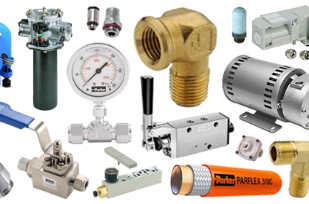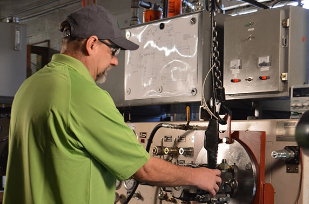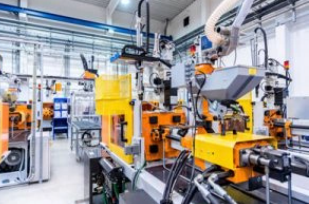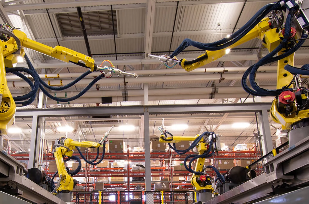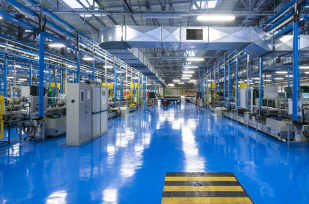Manufacturing businesses constantly find themselves regrouping to account for evolving trade deals, tax structures, and government regulations. Most certainly, to remain competitive, businesses must also constantly look for ways to cut costs whilst still remaining relative and innovative. Manufacturing CEOs look to technology investments to help them thrive in such a highly competitive and rapidly changing global manufacturing environment.
Of course, being a global competitor against low-cost countries also enables manufacturing businesses to consider reshoring. Job announcements related to reshoring and foreign direct investment were 250% higher in the first three quarters of 2017 than in 2016.
Industry 4.0
A recent IndustryWeek article shows how Industry 4.0 is leading this tech investment trend in manufacturing.
What is Industry 4.0? Also referred to as the fourth industrial revolution, Industry 4.0 in a nutshell is an automation and data exchange process that empowers manufacturers to reconfigure and design operations as they so need to produce multiple variations and one-offs without manual intervention. The new technologies applied allow for better quality, higher efficiency, maximized production speed, and lower operational costs.
IndustryWeek pointed to the following as having the greatest impact thus far:
- Mobile
- Cloud
- Internet of Things
- Big data and analytics
Those with the highest expectations for future performance included:
- 3D printing
- Robotics / Automation
- Cognitive computing and AI
- Block chain and augmented/virtual reality
In a recent survey of the global manufacturing environment, titled “IDC FutureScape: Worldwide Manufacturing Predictions 2018,” IDC reports that manufacturers of all shapes and sizes are changing rapidly due to new ecosystems, new digital tech, new competition, and evolving business practices. According to IDC Research V.P. Kimberly Knickle, leaders in the industry will be those who’ve most readily been able to adopt digital capabilities that create business value. What are these digital capabilities?
Manufacturing Tech Trends For 2018
According to research, the following factors are set to have the greatest value to and impact on 2018 U.S. manufacturing businesses:
1. Industry Clouds
Driven mainly by the Internet of Things, IDC predicts that industry clouds will be utilized by 75% of all 2020 manufacturers, with a third monetizing data contributions. Equipment and processes are connected in real time by the Internet of Things. It also improves operation efficiency and decision making. When it comes to analytics and sharing the info with customers and suppliers, industry clouds are hailed by experts as the ideal solution.
This is perhaps the most aggressively trending tech within the manufacturing sector, with almost every manufacturer having some facet of smart manufacturing and technologies within at least one of their production zones. Initial implementation of smart manufacturing is usually focused on predictive maintenance and predictive energy. However, the benefits from more complicated initiatives and algorithms, such as in-line predictive production quality, are becoming more clear to CEOs and are set to be a greater focus in the near future.
3. Digital Platforms
IDC predicts that digital platforms will be relied upon by over half of the top manufacturers by 2012 to enhance ecosystem investments and support almost 1/3 of their revenue. They’ll be the hub for other key emerging smart technologies, making them a critical lead-in effort within the tech race.
4. OT And IT Converge
As more manufacturing businesses are becoming open-minded to an industrial IT network, operational technology (OT) and information technology (IT) will continue to converge at a rapid pace. Jennifer Rideout, of AUTOMATION magazine, called it a “top-of-mind” issue for 2018. She also points out that convergence plays a pivotal role in implementing Industry 4.0 projects. IDC predicts convergence will create a more streamlined production efficiency since almost 1/3 of all OT and IT staff will have had interdisciplinary experience between the two fields by 2019.
5. Digitally Enhanced Supply Chains
Around 30% of all 2020 manufacturing supply chains are predicted to have analytics-driven cognitive capabilities in place. IDC predicts a 10% increase in cost efficiency and a 5% increase in service performance via digitally enhanced supply chains. It would leverage data from the Internet of Things to deliver real-time analysis of supply chain operations. Simulations and virtual models could even be constructed using the data.
6. Expansion Of Services
New services via smart technologies will open the door for manufacturers to generate a new or expanded line of revenue. A manufacturer implements the Internet of Things to provide sales and marketing business lines with new services, for example. Revenue generated from digital services and products increases. New revenue is driven from data and data related services.
Is Your Business Ready?
These are just the six most notable and dominating of the many emerging manufacturing tech trends for 2018. Manufacturers are forever searching out the ways to best concentrate their resources on marketing and primary production. Industry 4.0 is and will continue to pave how well U.S. manufacturers compete, succeed, and flourish. Businesses in today’s global market simply must have the agility to adapt to rapid change and the technology to make those changes efficient in order to keep pace with complex and demanding landscapes, partnerships, logistics, regulations, and standards. This means that it’s imperative for U.S. manufacturers to holistically assess their needs and take advantage of applicable emerging digital platform trends to meet those needs.

